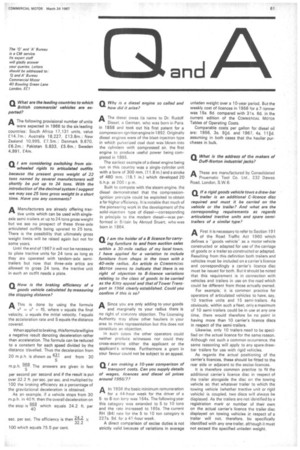Q Why is a diesel engine so called and how did it arise?
Page 63

If you've noticed an error in this article please click here to report it so we can fix it.
A The diesel owes its name to Dr. Rudolf
Diesel, a German, who was born in Paris in 1858 and took out his first patent for a compression-ignition engine in 1892. Originally diesel engines were of the blast-injection type in which pulverized coal dust was blown into the cylinders with compressed air. the first engine to produce useful power being completed in 1895.
The earliest example of a diesel engine being run in this country was a single-cylinder unit with a bore of 300 mm. (11.8 in.) and a stroke of 460 mm. (18.1 in.) which developed 20 b. h. p. at 200 rpm.
Built to compete with the steam engine, the diesel demonstrated that the compressionignition principle could be exploited to obtain a far higher efficiency. It is notable that much of the pioneering work in the development of the solid-injection type of diesel—corresponding in principle to the modern diesel—was performed in Britain by Akroyd Stuart, who was born in 1864.








































































































